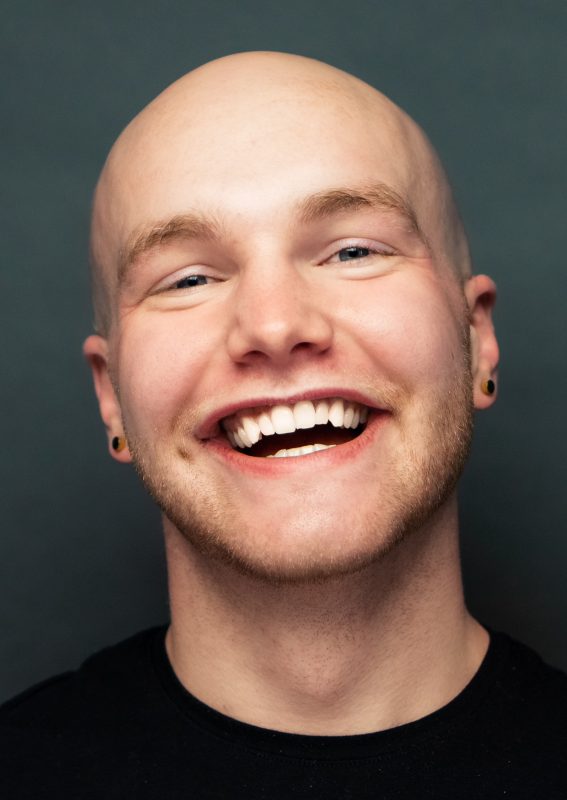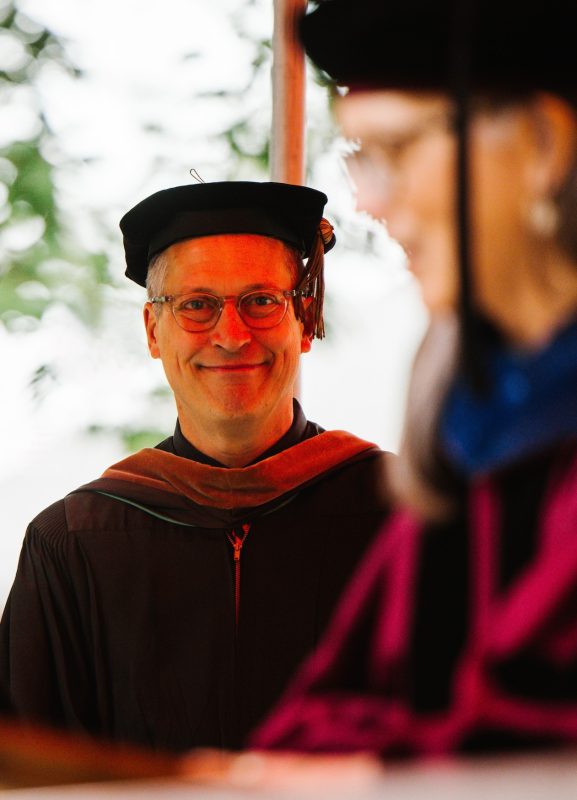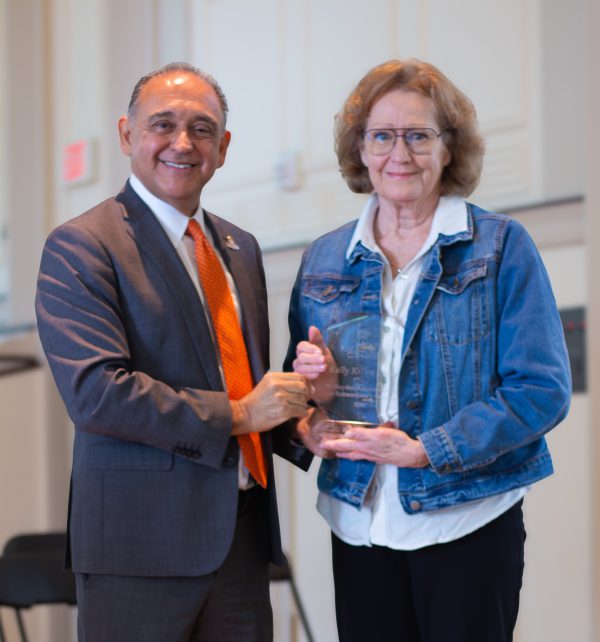Something big, green and hungry is taking root at Kalamazoo College this week with Mo Silcott ’27 and Lee Zwart ’27 bringing it to life. The two will provide the puppetry behind the Audrey II, a giant plant with a taste for trouble, in the dark musical comedy Little Shop of Horrors, presented by the Festival Playhouse May 15–18.
In the play, Seymour—a wallflower of an assistant at Mr. Mushnik’s plant shop—desires Audrey, a beautiful co-worker who dates a sadistic dentist. After a sudden solar eclipse, Seymour finds a mysterious plant that looks like a Venus fly trap and names it the Audrey II.
Despite Seymour’s best efforts, Audrey II sickens until Seymour pricks his finger on a thorn, causing the plant to hungrily open its pod. Business begins to blossom for the shop as the bloodthirsty Audrey II grows like a weed. The situation, however, seeds problems, forcing Seymour to nip them in the bud. Max Goldner ’27 portrays Seymour, James Hauke ’26 plays Mr. Mushnik, Sophia Merchant ’25 performs as Audrey, and Drew Oss ’28 presents Orin the Dentist.

“Little Shop has always been one of my favorite shows, and I think the plot speaks to a lot of Americans’ current situation, whether that be in the same sense as Seymour or not,” Silcott said. “We might want to get out of a bad spot, to be somewhere that isn’t the harsh reality we find ourselves in during our day-to-day life. Little Shop gives the audience a chance to laugh at that a little bit and digest those realities in a show that manages to take itself seriously while also finding places for laughter.”
Bringing the botanical behemoth to life is no small feat, but Silcott and Zwart are up for the challenge. The Festival Playhouse is renting the puppets with Silcott performing as the smaller Audrey II in the first act and Zwart performing as the full-grown beast in the second act.
“One of the biggest challenges of performing the role of Audrey II is having to sit still on stage for about 25 minutes,” Silcott said. “Most of my acting consists of me sitting idly, and I didn’t realize how hard it is to actually just sit in one position with a full costume on, one that is stuffed with extremely warm materials. It’s very difficult to not move in a puppet that is a lot of fun to operate.”
Zwart potentially faces an even bigger challenge, wearing a harness that allows him to operate an upper and a lower pod of the Audrey II plant: He faces a full-body workout while synching his movements with an offstage voice.
“It’s physically taxing,” Zwart said. “I have to maneuver all of myself around to move this puppet and it’s pretty heavy and hot.”
After weeks of such exertion, Zwart is looking forward to opening night.
“It’s always fun to practice a play just running through it, but hearing the audience laughing and clapping is really very rewarding, especially for a play that’s as over the top as Little Shop.”
The student-led production promises big vocals, bold costumes and plenty of leafy-green surprises, providing the cast and crew with ambitious challenges. The musical will be staged at 7:30 p.m. Thursday, May 15–Saturday, May 17, and at 2 p.m. Sunday, May 18, in the Festival Playhouse Theatre at 129 Thompson St. Thursday’s show will include a talkback with the cast after the performance. Tickets are available online or by calling the Festival Playhouse at 269.337.7333.
“I’m really looking forward to the audience’s reaction to the puppets,” Silcott said. “I can’t see too much, so all of my cues and understanding of how my performance is going, is through sound. The best part of a production like this is seeing the audience’s initial reaction to each of the puppets, and that gives me a lot of motivation to perform and to perform well. Working with this cast has been a truly incredible experience and I’m especially excited to perform with them in the coming week.”



























